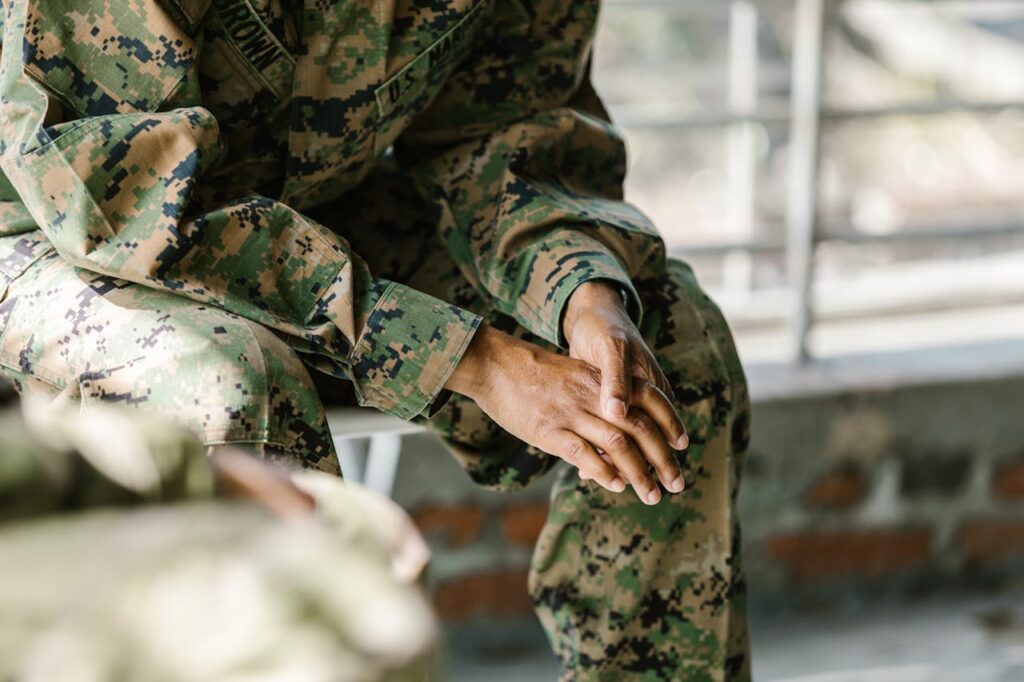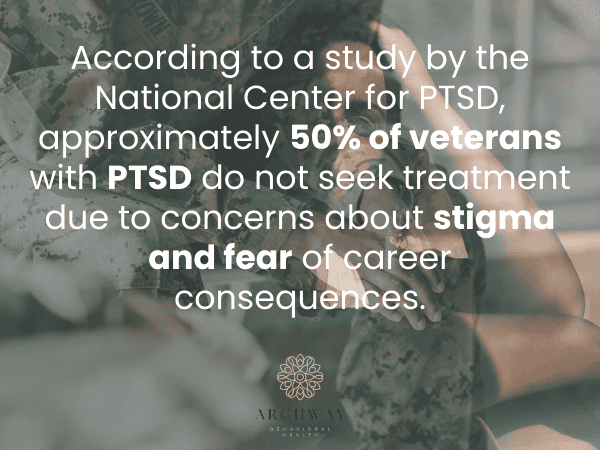Military service members face unique pressures that put them at heightened risk for mental health challenges. The intense demands of service—such as deployment, exposure to combat, separation from family, and adapting to civilian life after service—can impact mental well-being. Despite these challenges, stigma around mental health is deeply rooted in military culture, often deterring service members from seeking essential support. Recognizing this stigma, understanding its causes, and exploring effective treatment options can pave the way for improved mental health among military personnel.
Statistics of Mental Health Problems and Stigma Among Military Personnel
Mental health issues are common in the military, with recent studies highlighting the prevalence and significant impact on service members. According to the National Institute of Mental Health, nearly 20% of active-duty military personnel experience some form of mental health disorder each year. Conditions like post-traumatic stress disorder (PTSD), depression, and anxiety are among the most common, often due to repeated exposure to high-stress environments and trauma.
Additionally, stigma plays a major role in hindering treatment. Surveys indicate that over 60% of military personnel with mental health concerns avoid seeking help due to stigma, fearing potential career consequences, judgment, or perceived weakness. This reluctance to seek care not only affects individual well-being but can also influence overall unit readiness and morale.
The Impact of Military Life on Mental Health
Military service can profoundly impact mental health due to continuous exposure to high-stress environments and the risk of traumatic events. Military members commonly experience mental health issues, with anxiety, depression, PTSD, and bipolar disorder among the most prevalent.
Anxiety Disorders
The demands of deployment, vigilance in high-risk zones, and the stress of readjusting to civilian life can contribute to anxiety disorders among military members. Anxiety affects concentration, mood, and physical health, leading to sleep disturbances, chronic stress, and irritability.
Depression
Service members often endure long periods away from family, witness traumatic events, and face considerable uncertainty about future deployments or missions. This lifestyle can lead to feelings of isolation and depression. When left unaddressed, depression can disrupt daily life and relationships, with symptoms ranging from fatigue to suicidal thoughts.
Post-Traumatic Stress Disorder (PTSD)
PTSD is highly prevalent among military personnel who have experienced combat or trauma. Those with PTSD may relive traumatic events through flashbacks, experience hypervigilance, and struggle with anxiety in everyday situations. Without effective treatment, PTSD can hinder a person’s quality of life, affecting everything from social relationships to professional responsibilities.
Bipolar Disorder
For those with bipolar disorder, military life’s unpredictability and stress can exacerbate mood swings and emotional instability. Service members may experience prolonged periods of depression or elevated energy (mania or hypomania), impacting their mental health and ability to function effectively.
The Stigma Surrounding Mental Health in the Military
In military culture, resilience, strength, and self-reliance are highly valued traits. While these qualities are essential for service, they can also perpetuate a stigma around mental health, leading many service members to view seeking help as a sign of weakness. Key reasons for mental health stigma within the military include:
1. Perception of Weakness
Many military members fear that admitting to mental health struggles may be seen as a lack of resilience or personal strength. This perception can prevent service members from seeking help, fearing that others may judge or misunderstand their experiences.
2. Career Consequences
There is a widespread concern that a mental health diagnosis could harm career prospects, such as reducing chances for promotion, affecting security clearances, or limiting assignments. Fear of career repercussions can discourage service members from openly addressing their mental health needs.
3. Lack of Supportive Environment
In some cases, a culture of “toughing it out” still prevails, which can create an unsupportive environment. This lack of support can leave military personnel feeling isolated and as though they have nowhere to turn for help.
4. Self-Stigma
Many military members internalize the societal stigma around mental health, viewing their own struggles as a personal failure. This self-stigmatization can be particularly harmful, as it may prevent them from recognizing their mental health needs and accepting treatment.
5. Lack of Confidentiality Concerns
Some service members fear that their medical records, including mental health diagnoses, will not remain confidential and could become accessible within their command structure. This perceived lack of privacy discourages honest conversations about mental health needs.
Symptoms of Mental Health Issues Among Military Members
Service members may exhibit a range of symptoms that indicate mental health concerns. Recognizing these symptoms is the first step toward encouraging support and treatment. Common symptoms include:
Persistent Anxiety or Worry
Symptoms of anxiety are common among military personnel, especially those who have experienced combat. This anxiety can manifest as persistent worry, irritability, and difficulty relaxing or feeling secure.
Depression and Feelings of Hopelessness
Depression in the military can be characterized by a persistent feeling of sadness, a sense of hopelessness, loss of interest in previously enjoyable activities, and withdrawal from social interaction. In severe cases, depression can lead to thoughts of self-harm or suicide.
Flashbacks and Nightmares (PTSD)
Service members exposed to traumatic events may experience flashbacks or nightmares, which are common symptoms of PTSD. These episodes can feel incredibly real and disrupt sleep, leading to chronic exhaustion and heightened stress.
Mood Swings (Bipolar Disorder)
Some military members may experience periods of extreme energy, irritability, or high-risk behavior, followed by episodes of intense sadness and fatigue. These mood swings are often indicative of bipolar disorder and can affect both work performance and personal relationships.
Substance Use as a Coping Mechanism
To manage symptoms, some service members may turn to alcohol or drugs, which can quickly lead to dependency. Substance use disorders are commonly co-occurring with mental health conditions in the military.
Breaking the Stigma: Why Seeking Help Is a Sign of Strength
Addressing mental health challenges is not a sign of weakness but of courage. Recognizing this can lead to more open discussions about mental health within military communities and encourage a culture of support and understanding. Leaders, peers, and family members play essential roles in breaking down these barriers by fostering empathy and normalizing the need for mental health support. Mental Health Treatment centers like Archway Behavioral Health provide safe, confidential spaces where service members can work through their challenges without fear of judgment.
Treatment Options Tailored for Military Members
At Archway Behavioral Health, we offer a range of mental health treatment services tailored to address the unique needs of military personnel. By understanding and respecting their experiences, we provide specialized treatments designed to help them regain a sense of peace, purpose, and well-being.
Dialectical Behavior Therapy (DBT)
Dialectical Behavior Therapy is a therapy approach that equips individuals with tools to manage intense emotions and build coping skills. This therapy is particularly useful for service members dealing with trauma or PTSD, as it emphasizes emotional regulation, mindfulness, and resilience.
Cognitive Behavioral Therapy (CBT)
Cognitive Behavioral Therapy is an evidence-based therapy that helps clients challenge and reframe negative thought patterns. It is highly effective for managing anxiety, depression, and PTSD, as it empowers individuals to identify and replace harmful thought processes with positive, actionable behaviors.
One-on-One Therapy
Individualized, one-on-one therapy provides a safe, private setting for military members to work directly with a licensed therapist. This personalized approach allows clients to delve into personal challenges, process trauma, and explore coping strategies specific to their experiences.
Group Therapy Programs
Group therapy program provides an opportunity for military members to connect with peers who have experienced similar challenges. These group sessions foster camaraderie and allow participants to support each other, share experiences, and feel less isolated in their struggles.
Specialized Programs
Archway Behavioral Health offers specific treatment programs for various mental health conditions, including an Anxiety Treatment Program, Bipolar Treatment Program, Depression Treatment Program, and Trauma Treatment Program. These specialized programs are designed to address each condition’s unique aspects with targeted, evidence-based care.
Partial Hospitalization Program (PHP)
Partial Hospitalization Program offers a structured environment where individuals can receive intensive treatment during the day while returning home in the evening. This approach provides comprehensive support for those requiring more hands-on care, allowing them to benefit from therapy sessions, group support, and skill-building workshops.
Intensive Outpatient Program (IOP)
Our Intensive Outpatient Program offers flexible scheduling for individuals needing substantial support while maintaining their daily responsibilities. With multiple therapy sessions per week, clients can address their mental health concerns without stepping away from their personal or professional lives.
How Archway Behavioral Health Supports Military Members
At Archway Behavioral Health, we are committed to creating a supportive, confidential environment where military members can prioritize their mental health. Our team of experienced therapists and clinicians understands the unique challenges that service members face and provides comprehensive, trauma-informed care to support their healing journey. By offering accessible mental health treatment services, we aim to break down barriers and empower military members to lead healthier, more fulfilling lives.
Final Thoughts
Mental health stigma within the military can be a significant barrier to treatment, preventing many from receiving the support they need. However, by fostering an environment of understanding and respect, we can help military members see mental health care as a vital component of overall well-being and readiness. With programs like Cognitive Behavioral Therapy, Dialectical Behavior Therapy, group therapy, and intensive outpatient support, Archway Behavioral Health stands ready to help service members take charge of their mental health. Seeking help is not a weakness but a courageous step toward recovery and resilience. Reach out today at (888) 488-4103 and take the first step towards hope and healing.
Frequently Asked Questions (FAQs)
What mental health issues are most common among military personnel?
Mental health issues in the military can include anxiety disorders, depression, post-traumatic stress disorder (PTSD), bipolar disorder, and substance abuse. The nature of military service, including exposure to combat and high-stress environments, increases the risk of these conditions.
Why do military members avoid seeking help for mental health problems?
Many military personnel avoid seeking help due to the stigma surrounding mental health. There is a fear of being judged as weak, concerns about career repercussions, and worries about privacy and confidentiality. This stigma prevents many service members from accessing the care they need.
How can mental health stigma be reduced in the military?
Reducing stigma requires a cultural shift within the military. Leadership must prioritize mental health as part of overall readiness and wellness. Encouraging open discussions, providing confidential care, and normalizing mental health treatment can help remove barriers to seeking help.
What are the symptoms of PTSD in military personnel?
Symptoms of PTSD include flashbacks, nightmares, emotional numbness, hypervigilance, anxiety, and difficulty concentrating. These symptoms can disrupt daily life and require specialized care to manage effectively.
What treatments are available for military personnel with mental health issues?
Treatment options include cognitive behavioral therapy (CBT), dialectical behavior therapy (DBT), individual counseling, group therapy programs, and specialized programs for anxiety, depression, and trauma. Intensive outpatient programs (IOP) and partial hospitalization programs (PHP) are also effective for more intensive care.
How can I encourage a military member to seek mental health treatment?
Start by creating a supportive and non-judgmental environment. Acknowledge the strength it takes to seek help and emphasize that mental health care is an essential part of overall well-being. Offering information on confidential and specialized mental health services can also help ease their concerns.
How does untreated mental health affect a military member’s career?
Untreated mental health conditions can lead to difficulties with job performance, strained relationships, and increased stress, which could ultimately impact a service member’s career progression and quality of life. Seeking treatment early is crucial to managing symptoms and maintaining readiness.



